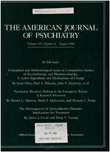Genetic and clinical implications of alcoholism and affective disorder
Abstract
The association between alcoholism and affective disorders is complex and has fomented much debate. Problems occur because of confusion in definitions (e.g., the distinction between drinking and alcoholism on the one hand and sadness and major affective disorders on the other) and because sadness and even intense temporary secondary affective episodes are often seen in the course of alcoholism. The author notes five possible factors contributing to the confusion between these two disorders and points out several ways to approach the problems of patients who have more than one concurrent clinical syndrome. Using the data from a literature review, he concludes that alcoholism and affective disorder appear to be independent diseases with some overlap in clinical symptoms.
Access content
To read the fulltext, please use one of the options below to sign in or purchase access.- Personal login
- Institutional Login
- Sign in via OpenAthens
- Register for access
-
Please login/register if you wish to pair your device and check access availability.
Not a subscriber?
PsychiatryOnline subscription options offer access to the DSM-5 library, books, journals, CME, and patient resources. This all-in-one virtual library provides psychiatrists and mental health professionals with key resources for diagnosis, treatment, research, and professional development.
Need more help? PsychiatryOnline Customer Service may be reached by emailing [email protected] or by calling 800-368-5777 (in the U.S.) or 703-907-7322 (outside the U.S.).



